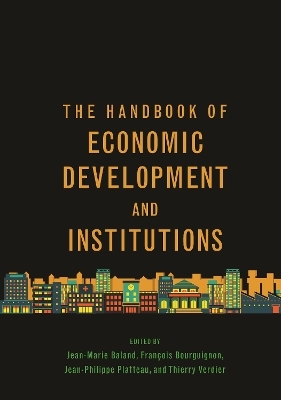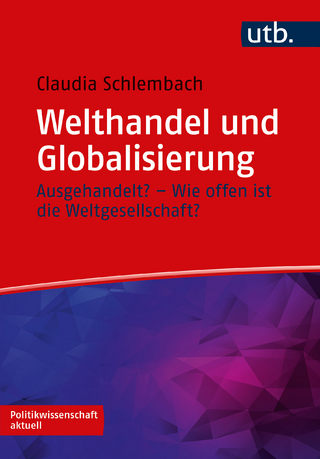
The Handbook of Economic Development and Institutions
Seiten
2020
Princeton University Press (Verlag)
978-0-691-19121-8 (ISBN)
Princeton University Press (Verlag)
978-0-691-19121-8 (ISBN)
The definitive reference on the most current economics of development and institutionsThe essential role that institutions play in understanding economic development has long been recognized across the social sciences, including in economics. Academic and policy interest in this subject has never been higher. The Handbook of Economic Developmen
The definitive reference on the most current economics of development and institutions
The essential role that institutions play in understanding economic development has long been recognized across the social sciences, including in economics. Academic and policy interest in this subject has never been higher. The Handbook of Economic Development and Institutions is the first to bring together in one single volume the most cutting-edge work in this area by the best-known international economists. The volume’s editors, themselves leading scholars in the discipline, provide a comprehensive introduction, and the stellar contributors offer up-to-date analysis into institutional change and its interactions with the dynamics of economic development.
This book focuses on three critical issues: the definitions of institutions in order to argue for a causal link to development, the complex interplay between formal and informal institutions, and the evolution and coevolution of institutions and their interactions with the political economy of development. Topics examined include the relationship between institutions and growth, educational systems, the role of the media, and the intersection between traditional systems of patronage and political institutions. Each chapter—covering the frontier research in its area and pointing to new areas of research—is the product of extensive workshopping on the part of the contributors.
The definitive reference work on this topic, The Handbook of Economic Development and Institutions will be essential for academics, researchers, and professionals working in the field.
The definitive reference on the most current economics of development and institutions
The essential role that institutions play in understanding economic development has long been recognized across the social sciences, including in economics. Academic and policy interest in this subject has never been higher. The Handbook of Economic Development and Institutions is the first to bring together in one single volume the most cutting-edge work in this area by the best-known international economists. The volume’s editors, themselves leading scholars in the discipline, provide a comprehensive introduction, and the stellar contributors offer up-to-date analysis into institutional change and its interactions with the dynamics of economic development.
This book focuses on three critical issues: the definitions of institutions in order to argue for a causal link to development, the complex interplay between formal and informal institutions, and the evolution and coevolution of institutions and their interactions with the political economy of development. Topics examined include the relationship between institutions and growth, educational systems, the role of the media, and the intersection between traditional systems of patronage and political institutions. Each chapter—covering the frontier research in its area and pointing to new areas of research—is the product of extensive workshopping on the part of the contributors.
The definitive reference work on this topic, The Handbook of Economic Development and Institutions will be essential for academics, researchers, and professionals working in the field.
Jean-Marie Baland is professor of economics at the University of Namur. He is the coeditor of Inequality, Cooperation, and Environmental Sustainability (Princeton). François Bourguignon is emeritus professor of economics at the Paris School of Economics, where he was previously director. He is the author of The Globalization of Inequality (Princeton). Jean-Philippe Platteau is professor emeritus of economics at the University of Namur. He is the author of Islam Instrumentalized. Thierry Verdier is professor of economics at the Paris School of Economics, École des Ponts ParisTech, and Pontifical Catholic University of Rio de Janeiro. He is the coeditor of The Organization of Firms in a Global Economy.
| Erscheinungsdatum | 23.01.2020 |
|---|---|
| Zusatzinfo | 48 b/w illus. 25 tables. |
| Verlagsort | New Jersey |
| Sprache | englisch |
| Maße | 178 x 254 mm |
| Themenwelt | Wirtschaft ► Volkswirtschaftslehre ► Wirtschaftspolitik |
| ISBN-10 | 0-691-19121-2 / 0691191212 |
| ISBN-13 | 978-0-691-19121-8 / 9780691191218 |
| Zustand | Neuware |
| Haben Sie eine Frage zum Produkt? |
Mehr entdecken
aus dem Bereich
aus dem Bereich
ausgehandelt? – wie offen ist die Weltgesellschaft?
Buch | Softcover (2024)
UTB (Verlag)
22,00 €
Theorie und Anwendung
Buch | Hardcover (2024)
Vahlen, Franz (Verlag)
39,80 €
wie sich unsere Wirtschaftspolitik ändern muss, damit wir globale …
Buch | Hardcover (2024)
Wiley-VCH (Verlag)
39,99 €


